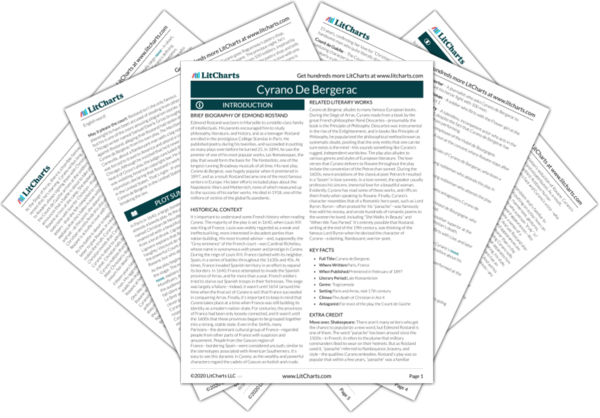The paradox of Cyrano de Bergerac—and the source of a lot of its comedy—is that Cyrano, a man who prides himself on his independence, his “panache,” and his refusal to serve a master, must keep his word to another man: the clumsy, foolish Christian de Neuvillette. In general, the play explores the nuances of loyalty and honor by studying the relationships between Christian, Cyrano, and Roxane.
To begin with, Cyrano sacrifices his most important assets—his pride and honor—out of a sense of romantic loyalty to Roxane. He’s made a name for himself throughout town by defending his honor: i.e., attacking anyone who criticizes his enormous nose. Yet because Roxane loves the handsome Christian, she makes Cyrano promise to take care of Christian at all costs. Cyrano is then forced to sit in (hilarious) silence when Christian insults Cyrano’s nose, knowing that he can’t fight the young man because of his loyalty to Roxane and her wishes.
The reason that Cyrano agrees to mentor Christian, remaining loyal to a young man for whom he seems to have little real respect, is more complicated than it might seem. While it’s true that Cyrano is acting because of his feelings for Roxane—he doesn’t dare disobey the love of his life, no matter how painful the consequences of obeying might be—Cyrano also agrees to help Christian because doing so gives him the opportunity to express his own love for Roxane. Cyrano’s loyalty to Christian is an act of both self-interest and selflessness. Cyrano sacrifices some of his pride and honor, but in return, he gets the unique opportunity to seduce Roxane without the embarrassment of rejection. Here, Rostand suggests that loyalty is distinct from and sometimes contradictory to love: it is both selfish and selfless, and doesn’t necessarily align with one’s romantic feelings.
As the play goes on, Cyrano’s motives for loyalty to Christian become harder to articulate. He swears to protect Christian at all costs, but when Christian dies in battle, Cyrano still doesn’t reveal his love for Roxane. His guilt at having allowed Christian to die keeps him silent for the next 15 years, and it’s only when he’s on his deathbed that he reveals how he truly feels. Cyrano’s loyalty to Christian is an important part of his character. Although he’s under no real obligation to keep his feelings hidden after Christian’s death, he continues to do so out of a sense of honor. Although Cyrano has sacrificed his pride and reputation to protect Christian, he then asserts his honor—that is, his honesty, his integrity, etc.—by remaining loyal to Christian and keeping his painful secret. Without this loyalty and honor, Cyrano would be a fundamentally selfish character, and his desire to assert his independence would appear selfish and tiresome—but because of these qualities, Cyrano transcends selfishness and becomes an impressive, even noble character. In spite of his desire to be free of social norms, he also has a strong sense of honor and a rigid moral code, tethered not only to his love for Roxane, but also to his concept of himself as being a man of his word.
Loyalty and Honor ThemeTracker

Loyalty and Honor Quotes in Cyrano De Bergerac
Act 2, Scene 6 Quotes
ROXANE:
Then you will be his friend?
CYRANO:
I swear!
ROXANE:
And he shall fight no duels, promise!
CYRANO:
None.
Act 3, Scene 1 Quotes
ROXANE:
You would vex a saint!. . . But 'tis your jealousy.
CYRANO (starting):
What mean you?
ROXANE:
Ay, your poet's jealousy!
Act 3, Scene 12 Quotes
ROXANE:
That he shall be faithful!
CYRANO:
Doubtless, but. . .
ROXANE:
That he will write oft?
CYRANO (pausing):
That, I promise you!
Act 4, Scene 4 Quotes
CYRANO (without lifting his eyes from his book):
And your white scarf?
DE GUICHE (surprised and gratified):
You know that detail?. . . Troth! It happened thus:
While caracoling to recall the troops
For the third charge, a band of fugitives
Bore me with them, close by the hostile ranks:
I was in peril—capture, sudden death!--
When I thought of the good expedient
To loosen and let fall the scarf which told
My military rank; thus I contrived
--Without attention waked--to leave the foes,
And suddenly returning, reinforced
With my own men, to scatter them! And now,
--What say you, Sir?
Act 5, Scene 5 Quotes
ROXANE:
Ah!
Things dead, long dead, see! how they rise again!
--Why, why keep silence all these fourteen years,
When, on this letter, which he never wrote,
The tears were your tears?
CYRANO (holding out the letter to her):
The bloodstains were his.











